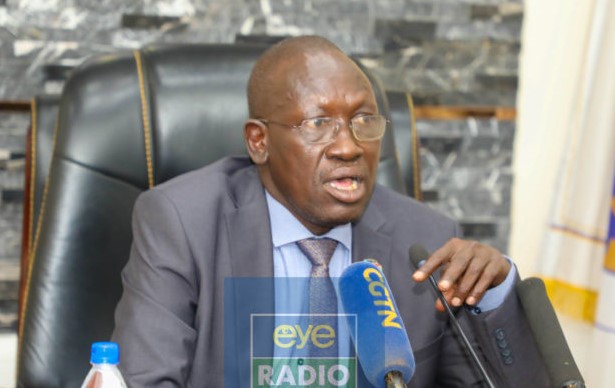
Moses Makur, Central Bank Governor speaking to media in Juba - Photo: Lou Nelson/Eye Radio - 11th Jan. 2022.
The governor of the Central Bank has accused what he calls ‘some powerful individuals’ in the country of working against the economic reforms the government is undertaking.
Moses Makur, however, did not mention who the individuals are.
In April last year, the central bank directed commercial banks to use the market exchange rate while trading in foreign currencies.
Makur said those individuals were benefiting from the variation in the dollar rate between the official rate at the central bank and the parallel or black market.
In the same month, the Ministry of Finance announced enforcing reforms to ensure there is transparency in the management of revenues.
In August 2020, President Salva Kiir instructed the Economic Cluster of the transitional government to proceed with the economic reform agenda, following weeks of assessment of the national revenue stream.
In July same year, the Economic Cluster subcommittee conducted investigations on all revenue collection points to assess the amount being collected and how revenues are remitted into the public account.
In its preliminary findings, the committee stated that import taxes among others were still being channeled into private bank accounts.
South Sudan, an oil-dependent country has faced its worst economic conditions due over reliance on hard currency from oil sales.
The current production levels of crude oil have dropped from 250,000 barrels per day to around 175,000 barrels per day.
According to economists, this has reduced the government’s revenue, dwindling the economy.
Speaking to the press in Juba yesterday, the central bank governor, Moses Makur said the government was recently commended by the World Bank and the International Monetary Fund, or IMF for what he described as ‘economic reforms’.
He however, said the current economic reforms the government is pursuing is hurting some powerful people in the country.
“Reform is not a unanimous agenda by all South Sudanese, some people are working against the reform itself, because they were very comfortable with the status quo, what was happening, they don’t want it to be changed,” Makur told a press conference on Thursday.
“Some powerful people didn’t want to have a one dollar rate for everybody. Some people need to have a black market rate and an official rate, they come and get dollars in the official rate and they go and sell it in black market and they get their difference.
“This group is likely not to be happy with the current reforms because they used to benefit outside in the old system than this one.
“This one is more transparent and very good for the economy, but it does not favor the individuals, few who are benefiting. So the reform was impressive and we were really praised for that.”
Early this year, the chairperson of the Economic Cluster sub-committee, Onyo Adigo stated some individuals sabotaging reforms were black-listed.
He said the government was yet to take legal action against them.
According to the Corruption Perceptions Index, the level of corruption in the country is perpetuated by lack of “political accountability to facilitate anti-corruption mechanisms.
It noted that years of civil wars have also contributed to high-level corruption in some cases, involving members of the ruling class.
But the government has often dismissed such reports, saying they are unsubstantiated and meant to blackmail the country.
Before the outbreak of the coronavirus, South Sudan was said to have received about 5 million U.S dollars a day from the oil revenue.
Support Eye Radio, the first independent radio broadcaster of news, information & entertainment in South Sudan.
Make a monthly or a one off contribution.
Copyright 2024. All rights reserved. Eye Radio is a product of Eye Media Limited.